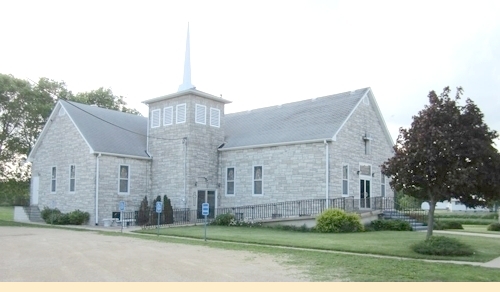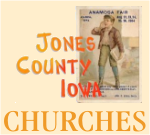
The German Lutheran St. John's Church of Olin, Iowa. This is not the first church organized in Olin, and though it is now fourteen years old, it has taken its place in upholding the high standards of the place and made its influence count for good.
The first services of the congregation were held in the old Advent church in South Olin, in the spring of 1895. Rev. John Moehl of Lost Nation, a pioneer worker of the German Lutheran church, was the organizer and founder. He spent weeks in traveling the rough roads, driving from early morning until late at night looking up the members of the German Lutheran faith who were scattered over the southern part of Jones county without church affiliations. He succeeded in finding from twelve to fifteen families who were willing to come to hear the first sermon preached by him in their mother tongue and in the Lutheran creed. Though these people were Americans and believed in American institutions, the religion of their youth seemed more effective and soothing to their spiritual appetite, when presented in their mother tongue.
After the services Rev. Mr. Moehl organized the congregation. The proposition had been thoroughly canvassed previously, and at this time the principal thing to do was to become an organized body with officers and a common object in view. The officers elected were: Deacons: Christian Quandt and George Langschwager; secretary, Hans Jurgensen; treasurer, Mathias Lorenzen.
The charter members were: C. Quandt, Geo. Langschwager, Fred Guhl. August Hartwig, Sr., Chas. Hartwig, Louis Westphal, Albert Hartwig, Mathias Lorenzen, Hans Jurgensen, Fred Scellin, Wilhelm Krueger, Charles Krueger, Julius Jurgensen.
Rev. Mr. Moehl continued to look after this charge faithfully for the three years, preaching every alternate Sunday, driving forty miles to meet his appointments. On account of his over-work, having three other places to supply, viz., Lost Nation and Nashville in Clinton county, and Wyoming in Jones county, his health began to fail. On his request Rev. W. H. Bunge was sent from Dubuque to aid him in the ministry of his four congregations.
Rev. Mr. Bunge had just finished his studies and was well qualified to take up the work laid out for him. Mr. Bunge took charge of the Olin and Wyoming churches; for the first three or four months residing at Wyoming and then moved to Olin where the Olin congregation had rented the old Stivers residence for a parsonage.
In the spring of 1900, the congregation purchased the residence of Theodor Clothier on the corner of Benton and Second streets in the heart of the town of Olin, for a parsonage, and here on the corner lot erected their own church edifice which was dedicated on Sunday July 15, 1900. The church is a frame building twenty-eight by forty-eight with a fifty-foot spire, erected at a total cost of two thousand, two hundred dollars. At the dedication services the following ministers took an active part, viz., Rev. John Bunge of Hawkeye, Rev. C. Rembold of Lost Nation, Rev. J. Monich and Rev. W. H. Bunge of Olin.
Rev. W. H. Bunge remained at Olin until the fall of 1904, when he accepted a call to Defiance, Ohio. The Olin congregation then extended a call to Rev. Paul Clemen of Butler Center, Iowa, who has been the minister ever since. Under his charge the congregation has grown and prospered, improving their property and paying off their indebtedness, so that at the present time the congregation is in a flourishing condition.






